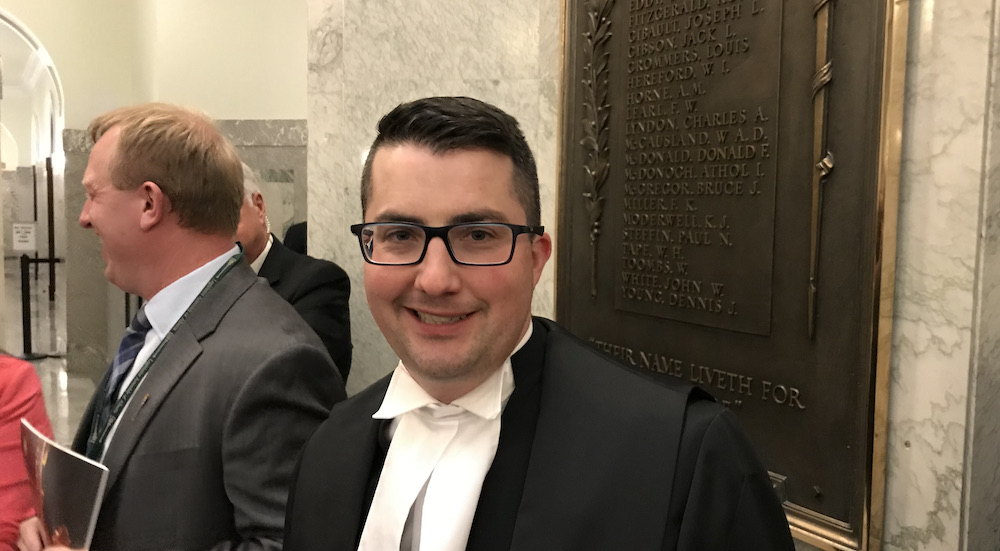Nathan Cooper, Speaker of the Alberta legislature, sailed very close to the wind when he lent his name to a letter signed by a group of dissident United Conservative Party MLAs opposed to the province’s latest COVID-19 restrictions.
While the position taken by the 18 rebel Conservative MLAs is repugnant and will inevitably encourage spread of the coronavirus, it is less clear whether Cooper, MLA for Olds-Didsbury, crossed the line into open partisanship and should therefore resign from his important and high-profile job as the presiding officer of the Alberta legislature.
This is a topic for legitimate debate.
There are not a lot of guidelines for how far Speakers in Westminster-style legislatures should dip their toes into the waters of partisanship. Practices vary in different places, including among Canadian legislatures.
By tradition, the Speaker of what we used to call the Mother of Parliaments in Westminster, renounces all party affiliations.
When a British Speaker runs for re-election, he or she runs as Speaker. British voters seem to have respected this tradition of scrupulous impartiality that extends beyond the chambers of Parliament.
Taking the impartiality of the chair to this extent has never caught on in Canada, undoubtedly for practical reasons. At this point in Canadian history, it would almost certainly amount to a formula for political suicide by the Speaker.
“The Speaker has almost always been elected from among the members of the governing party, and although the Speaker eschews partisan political activity, he or she does not make a complete break,” says the 2009 edition of the House of Commons Procedure and Practice. “When running for re-election, incumbent Speakers are usually careful to avoid partisan statements that might prejudice their perceived impartiality in the future.”
Said Michel Bissonnet, President of the Quebec National Assembly in 2004: “In Canada … in order to guarantee absolute impartiality, the convention is that Speakers renounce all official ties with their party. They do not take part in party meetings or in any partisan political activities.”
By this measure, Cooper went too far.
“Presiding officers must be extremely careful in what they do,” Bissonnet explained in remarks recorded in the summer 2004 edition of the Canadian Parliamentary Review. “We must always act with dignity and in a non-partisan manner in order to preserve the office’s impartiality and credibility with all colleagues.”
He noted that, in Quebec at least, this rule does not apply to deputy Speakers, who may fill in as the chairperson of a parliamentary session, but on whose shoulders the dignity of the office and the entire legislature does not rest.
Peter Milliken, Speaker of the House of Commons in those days, said in the same edition of the Review that “when I attend partisan meetings in Kingston (and the Islands, his riding), I do not make speeches denouncing the other parties, or in fact talk about politics.”
This would seem to be normal practice for Speakers at most times in most Canadian provinces.
However, Ken Kowalski, Speaker of the Alberta legislature at the time, described a different approach. “I am elected with a political party. I attend partisan events in and out of my riding.”
But then, as Kowalski pointed out, the Alberta legislature was a very different place in those days than the House of Commons or the legislature of Quebec, let alone the Alberta legislature today, which thanks to the success of the NDP in 2015 has moved much closer to the Canadian norm for political competitiveness.
“In Alberta, 74 of the 83 members belong to the majority party,” he explained. “The most difficult group to deal with is the government, the majority party, because the expectation is that you are still theirs. They still own you. You are still a member. You fought the wars.”
That was not exactly Cooper’s problem when he chose to lend his name to the letter, but it was something akin to it for the former Wildrose MLA.
He may or may not have been acting as a partisan UCP MLA, which might well be a legitimate reason to demand his resignation even if it was unlikely to be produce results.
But if he was acting out of loyalty as a partisan of a party that no longer exists in opposition to the government party he was elected as part of, I suppose you could make the case this is a slightly different matter, the political equivalent of getting off on a technicality.
After all, he wasn’t denouncing other parties, he was denouncing his own. This was certainly undignified, embarrassing even, and on COVID-19 it was wrong-headed to boot, but it probably ought not to be considered a firing offence.
Call it an error in judgment, that shouldn’t be repeated, but not a total disgrace.
David Climenhaga, author of the Alberta Diary blog, is a journalist, author, journalism teacher, poet and trade union communicator who has worked in senior writing and editing positions at The Globe and Mail and the Calgary Herald.
Image credit: David J. Climenhaga




